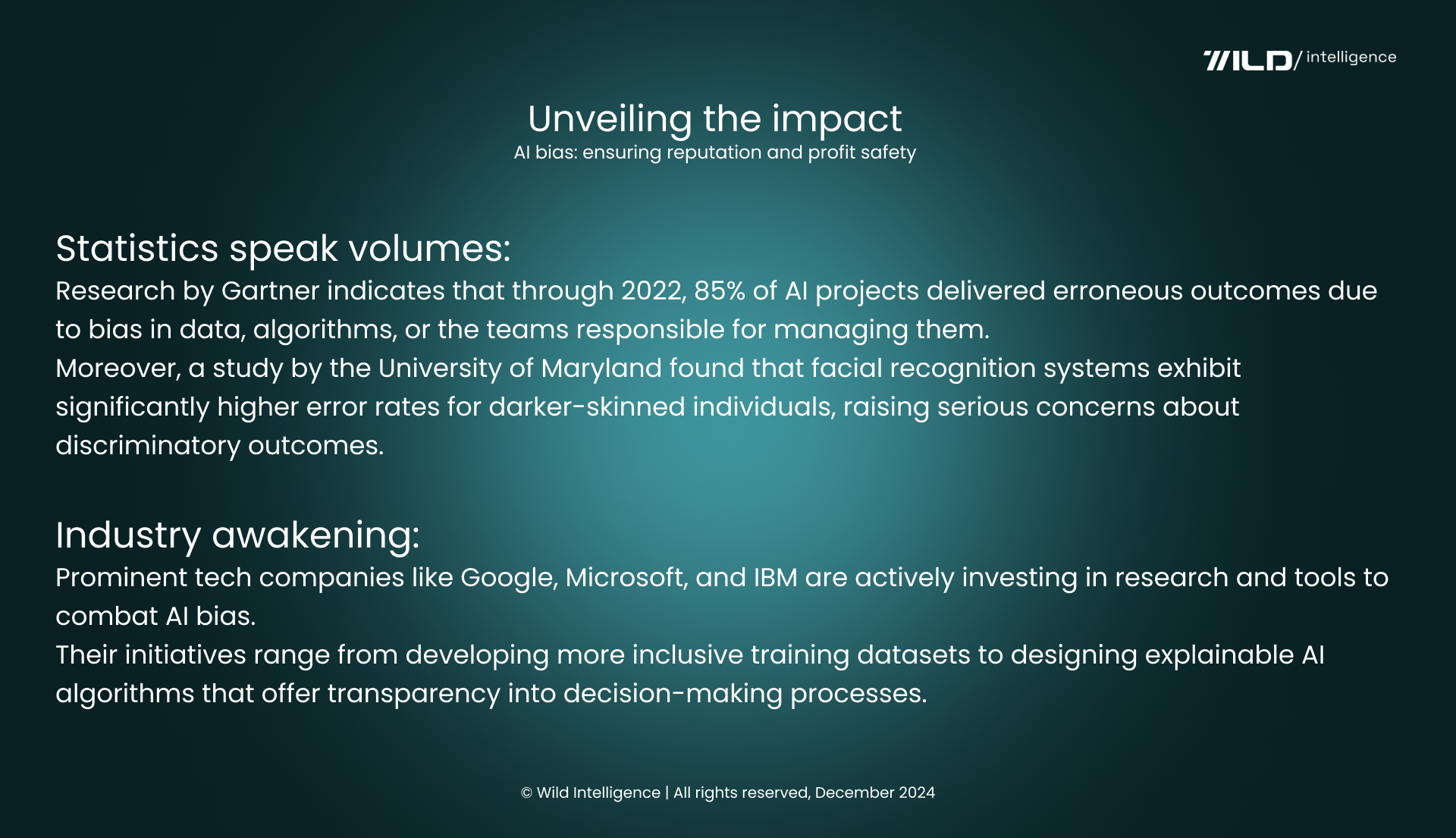AI bias: ensuring reputation and profit safety
Hello,
AI systems, trained on historical data that may reflect societal prejudices, can inadvertently perpetuate and even amplify these biases.
The consequences can be far-reaching, leading to discriminatory outcomes, eroded trust, and irreparable damage to an enterprise's reputation and financial standing.
From biased loan approvals and discriminatory hiring practices to skewed facial recognition and personalized recommendations, the manifestations of AI bias can be subtle yet impactful.
For decision leaders, recognizing and proactively mitigating these risks is not only an ethical imperative but also a strategic necessity.
Addressing AI bias head-on can unlock significant opportunities for enterprises:
Enhanced brand reputation: Demonstrating a commitment to fairness and inclusivity through unbiased AI bolsters public trust and loyalty.
Improved customer experience: AI systems that cater to diverse demographics drive customer satisfaction and expand market reach.
Increased innovation and competitive advantage: Mitigating bias fosters more creative and inclusive AI applications, leading to groundbreaking solutions.
The urgency of addressing AI bias: a call for action
Amazon's 2018 experience serves as a cautionary tale in the realm of AI bias. The company's AI-powered recruiting tool, trained on historical hiring data predominantly reflective of male candidates, inadvertently learned to favor male applicants.
This incident underscored a fundamental truth: AI systems are only as unbiased as the data they are trained on.
The implications of AI bias extend far beyond hiring practices. Gartner's research reveals that a staggering 85% of AI projects through 2022 delivered erroneous outcomes due to bias embedded in data, algorithms, or the teams responsible for managing them.
Moreover, a University of Maryland study exposed the discriminatory potential of facial recognition systems, demonstrating significantly higher error rates for darker-skinned individuals.
These sobering statistics highlight the urgent need to address AI bias proactively.
Tech giants like Google, Microsoft, and IBM are rising to the challenge, investing heavily in research and development initiatives to combat this pervasive issue.
Their efforts span the creation of more inclusive training datasets to designing explainable AI algorithms that promote transparency and accountability in decision-making processes.
The fight against AI bias is a multifaceted endeavor.
It demands a concerted effort from organizations across industries to prioritize diversity and inclusion in AI development teams, rigorously scrutinize training data for biases, and implement robust monitoring and auditing mechanisms to ensure AI systems remain fair and equitable.
The stakes are high.
The unchecked proliferation of AI bias can lead to discriminatory outcomes, erode public trust, and ultimately damage an organization's reputation and bottom line.
However, by proactively addressing these risks, businesses can unlock AI's full potential, fostering innovation, inclusion, and sustainable growth.
Conclusion: a roadmap to mitigating bias in AI
The future landscape:
The fight against AI bias is an ongoing endeavor. As AI technologies evolve, the potential for bias to emerge in new and unexpected ways will also.
Continued research, collaboration, and technological advancements will be crucial in ensuring AI's responsible and ethical deployment.
Actionable strategies for decision leaders:
Diverse and inclusive teams:
Assemble AI development teams that reflect the diversity of the communities they serve.Data Scrutiny and preprocessing:
Rigorously examine training data for biases and implement corrective measures.Explainable AI:
Prioritize AI models that offer transparency and insight into decision-making processes.Continuous monitoring and auditing:
Regularly assess AI systems for potential biases and take corrective action.Ethical AI frameworks:
Adopt ethical guidelines and governance structures to guide AI development and deployment.
Bias in AI poses a significant threat to enterprises, impacting reputation, customer trust, and, ultimately, the bottom line.
By recognizing these risks and taking proactive measures to mitigate bias, decision-makers can responsibly harness AI's power, fostering innovation, inclusion, and sustainable growth.
What steps is your organization taking to address the critical issue of bias in AI?


